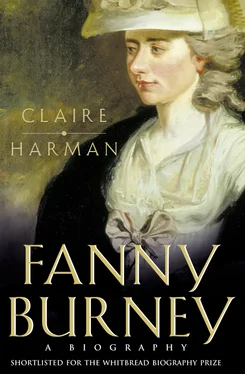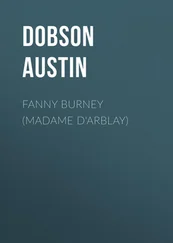The critic Margaret Anne Doody has pointed out how significant this incident is in terms of Burney’s later example to his children, all of whom preferred devious or passive means of problem-solving to direct action. The idea of gaining permission and not offending one’s superiors became ingrained in the family ethos; as Doody says: ‘Charles was to inculcate in his children the pervasive dread of offending someone whose permission should be asked, and he indicates some unwitting enjoyment of being the person who had power to give or withhold permission from his children, the only group to whom he could give it and to whom he need not apply for it.’ 31 This ‘pervasive dread’ was felt most sharply and most destructively by his second daughter, Fanny. Even when she was sixty-two years old, Fanny did not dare address her father ‘contrary to orders’ as he lay dying: ‘[t]he long habits of obedience of olden times robbed me of any courage for trying so dangerous an experiment’. 32
When the Grevilles went off to Italy in the summer of 1749, Burney was left to fend for himself and his young family. He had not lost Greville’s goodwill, but the patronage had gone, and from the splendours of Wilbury House Burney had to adjust to life as organist of St Dionis’s Backchurch in Fenchurch Street. He had taken over payment of the rent on Mrs Sleepe’s fan shop at Easter 1749, and may have been living there with Esther as man and wife some time before their wedding in June. His father died around the same time, and it was perhaps as early as this year that his mother and sisters Ann and Rebecca came from Shropshire to live over the shop at Gregg’s Coffee House in York Street, * run by a kinswoman, Elizabeth Gregg. Female dependants became, from this period onwards, a given of Charles Burney’s life. He was earning a tiny salary of £30 per annum from St Dionis’s and had to supplement it with odd jobs of teaching and composing (his first published song was to words by his friend the poet Christopher Smart).
One of his pupils was the Italian opera singer Giulia Frasi, at whose house and at the Cibbers’ Burney used to meet George Friedric Handel. Burney revered Handel’s music and, starstruck, had shadowed the great man round Chester once in his youth. On closer acquaintance, some of the glamour necessarily faded. Handel was short-tempered and extremely impatient of mistakes, bawling at Burney for singing a wrong note in one of Frasi’s lessons, as Burney recalled in his memoirs:
[…] unfortunately, something went wrong, and HANDEL, with his usual impetuosity, grew violent: a circumstance very terrific to a young musician. – At length, however, recovering from my fright, I ventured to say, that I fancied there was a mistake in the writing; which, upon examining, HANDEL discovered to be the case: and then, instantly, with the greatest good humour and humility, said, ‘I pec your barton – I am a very odd tog: – maishter Schmitt is to plame.’ 33
Burney was to meet a great many famous men on his way to becoming one himself, and had stories about most of them. Like his father before him, he knew the value of a good stock of anecdotes and told them well – comic voices included. He intuited that the ability to converse, to tell stories and (perhaps most importantly for his later connection with Dr Johnson) to listen was going to be his surest way to earn and keep a place in the influential company he craved. Fanny Burney thought her father’s written reminiscences did no justice to his anecdotal powers, or the charm and wit of his conversation, that they constituted ‘little more than Copying the minutes of engagements from his Pocket Books’. 34 She was clearly disappointed that he hadn’t left anything more solid for posterity to marvel at, but for Charles Burney the primary function of his stories (which drip with dropped names) was to make an immediate impression on a live audience.
With his patrons abroad and his responsibilities multiplying, the better life that Burney wanted for himself and his family seemed to be receding from his grasp in the early 1750s. Esther had given birth to two more children, James in June 1750 and Charles the year after. In order to keep the household going Burney pushed himself to do extra teaching, as well as playing in the theatre band almost every evening and composing. His rewriting of Arne’s Masque of Alfred had its first performance in February 1751 at Drury Lane, a momentous occasion for the twenty-four-year-old musician, but one he couldn’t attend because of a prior engagement at a subscription concert. ‘I fear my performance there was not meliorated by my anxiety for the fate of my Offspring at Drury Lane’, he wrote:
I hardly staid to play the final Chord of the last piece on the Organ, ere I flew out of the concert-room into a Hackney coach, in hopes of hearing some of my stuff performed (if suffered to go on) before it was finished; but neither the coachman nor his horses being in so great a hurry as myself, before I reached Temple bar, I took my leave of them, & ‘ran like a Lamp-lighter’, the rest of the way to the Theatre; and in a most violent perspiration, clambered into the Shilling Gallery, where scarcely I cd obtain admission, the rest of the House being extremely crowded, wch did not diminish the sudorific state of my person. I entered luckily, at the close of an Air of Spirit, sung by Beard, which was much applauded – This was such a cordial to my anxiety & agitated spirits, as none but a diffident and timid author, like myself, can have the least conception. 35
The impatience with the hackney coach, the muck sweat, the obscurity of the Shilling Gallery and the sense of eavesdropping on his own work’s first performance all seem to typify the urgency, anxiety and effort with which Burney strove to establish himself in the world. His work habits became almost manic; he pushed himself to the point of collapse, and then sank into protracted illnesses. In the winter before the debut of Alfred , he spent thirteen weeks in bed, a disastrously long time for a breadwinner, and certain to have agitated his restless mind. He was a small, very thin man, whose constitution was in fact as strong as an ox but who looked as if he might turn consumptive with every passing chill. In this, as well as in frame and feature, his second daughter was to resemble him closely.
The illness of 1751 must have alarmed Burney considerably. A short convalescence in Islington (then a balmy village) made him begin to credit his doctor’s insistence that he seek a permanent change of air. Reluctantly, he began to think of leaving the capital. When the offer of the post of organist at St Margaret’s Church in Lynn Regis, Norfolk, came up, combining sea air, light duties, a much larger salary and, since 1750, a regular coach service to London (splendidly horsed and armed to the teeth with muskets and bludgeons), it would have been folly to refuse. Burney moved there alone in September 1751 ‘to feel his way, & know the humours of the place’. 36
Lynn Regis (now known as King’s Lynn) was a thriving mercantile centre in the mid-eighteenth century, with valuable wine, beer and coal trade and corn exports worth more than a quarter of a million pounds a year. It supplied six counties with goods, and sent river freight as far inland as Cambridge. The wealthy aldermen of Lynn were keen to improve the cultural life of the town and to acquire a good music-teacher for their daughters; to this end they had increased the organist’s salary by subscription to £100 a year in order to attract Burney (clearly some influential friend or friends had a hand in setting this up), and were prepared to raise the pay even further when they feared they might lose him.
Burney at first resented his provincial exile: the organ in St Margaret’s was ‘Execrably bad’ and the audiences as unresponsive as ‘Stocks & Trees’, 37 but over the months his attitude changed. He began to be patronised by some of the ‘great folks’ of north Norfolk – the Townshends at Raynham, the Cokes at Holkham Hall, the Earl of Buckinghamshire at Blickling, Lord Orford (Horace Walpole’s nephew) at Houghton – and his spirits rose. All these grandees had large estates, beautiful grounds, art collections and libraries. Burney found that in Norfolk there might be, if anything, even more influential patrons at his disposal than in London, and that the burghers of Lynn were prepared to treat him as the ultimate authority on his subject. Soon he was writing to Esther in encouraging tones. Pregnant for the fourth time, she and the three children joined him in the spring of 1752, and it was probably at their first address in Lynn, Chapel Street, that their daughter Frances was born on 13 June. The new baby was baptised on 7 July in St Nicholas’s, the fishermen’s chapel just a few yards away, with Frances Greville, returned from the Continent, named as godmother.
Читать дальше












